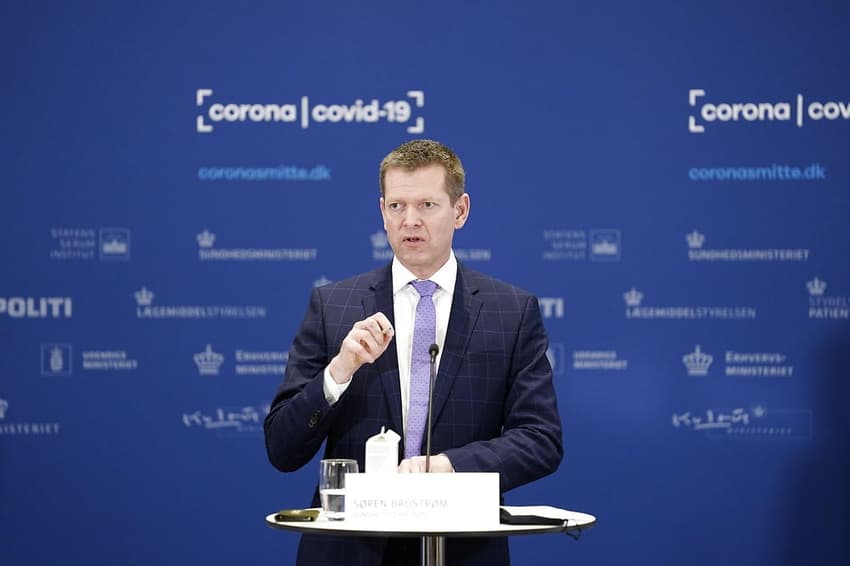Denmark extends pause of AstraZeneca vaccine for three weeks

Denmark on Thursday extended its suspension of the use of the AstraZeneca Covid-19 vaccine, saying it had not
ruled out a link to blood clots even though the European regulator has deemed it safe.
Denmark was the first country to suspend use of the AstraZeneca jab in mid-March, a decision then followed by more than a dozen other mostly European countries, after reports of blood clots potentially linked to the vaccine.
"We have today decided to extend our pause for another three weeks (until April 18th)," director of the Danish Health Authority Søren Brostrøm told a press conference.
"We have discussed this with domestic experts, who still believe that concerns remain. That's why we are sticking with the pause," Brostrøm said.
Causing most concern is a combination of blood clots, haemorrhaging and low blood platelet levels that was rare but occasionally fatal.
The World Health Organization has urged countries to continue administering the vaccine, arguing the benefits outweigh the risks.
EU drugs regulator EMA last week said the vaccine was "safe and effective" and not linked to a higher risk of blood clots, but could not "rule out definitively" its role in the rare clotting disorder.
Numerous European countries subsequently lifted their suspensions, while the Nordic nations maintained theirs pending further checks.
"We are not going against the EMA's decision, we are building upon it and going further," Brostrøm said.
Brostrøm added that they would continue to investigate whether certain groups were subject to particular risk, how high that risk was and whether it was acceptable.
Finland and Iceland resumed inoculations using the jab this week, but only for seniors.
Sweden was due to announce its decision later Thursday, and a Norwegian decision was expected on Friday.
Denmark, a country of 5.8 million people, has recorded a total of 227,894 cases of Covid-19 and 2,405 associated deaths.
The AstraZeneca suspension has slowed the country's ambitious vaccination rollout, with 5.7 percent of the population fully vaccinated and a first dose administered to 11.1 percent.
Comments (1)
See Also
Denmark was the first country to suspend use of the AstraZeneca jab in mid-March, a decision then followed by more than a dozen other mostly European countries, after reports of blood clots potentially linked to the vaccine.
"We have today decided to extend our pause for another three weeks (until April 18th)," director of the Danish Health Authority Søren Brostrøm told a press conference.
"We have discussed this with domestic experts, who still believe that concerns remain. That's why we are sticking with the pause," Brostrøm said.
Causing most concern is a combination of blood clots, haemorrhaging and low blood platelet levels that was rare but occasionally fatal.
The World Health Organization has urged countries to continue administering the vaccine, arguing the benefits outweigh the risks.
EU drugs regulator EMA last week said the vaccine was "safe and effective" and not linked to a higher risk of blood clots, but could not "rule out definitively" its role in the rare clotting disorder.
Numerous European countries subsequently lifted their suspensions, while the Nordic nations maintained theirs pending further checks.
"We are not going against the EMA's decision, we are building upon it and going further," Brostrøm said.
Brostrøm added that they would continue to investigate whether certain groups were subject to particular risk, how high that risk was and whether it was acceptable.
Finland and Iceland resumed inoculations using the jab this week, but only for seniors.
Sweden was due to announce its decision later Thursday, and a Norwegian decision was expected on Friday.
Denmark, a country of 5.8 million people, has recorded a total of 227,894 cases of Covid-19 and 2,405 associated deaths.
The AstraZeneca suspension has slowed the country's ambitious vaccination rollout, with 5.7 percent of the population fully vaccinated and a first dose administered to 11.1 percent.
Join the conversation in our comments section below. Share your own views and experience and if you have a question or suggestion for our journalists then email us at [email protected].
Please keep comments civil, constructive and on topic – and make sure to read our terms of use before getting involved.
Please log in here to leave a comment.